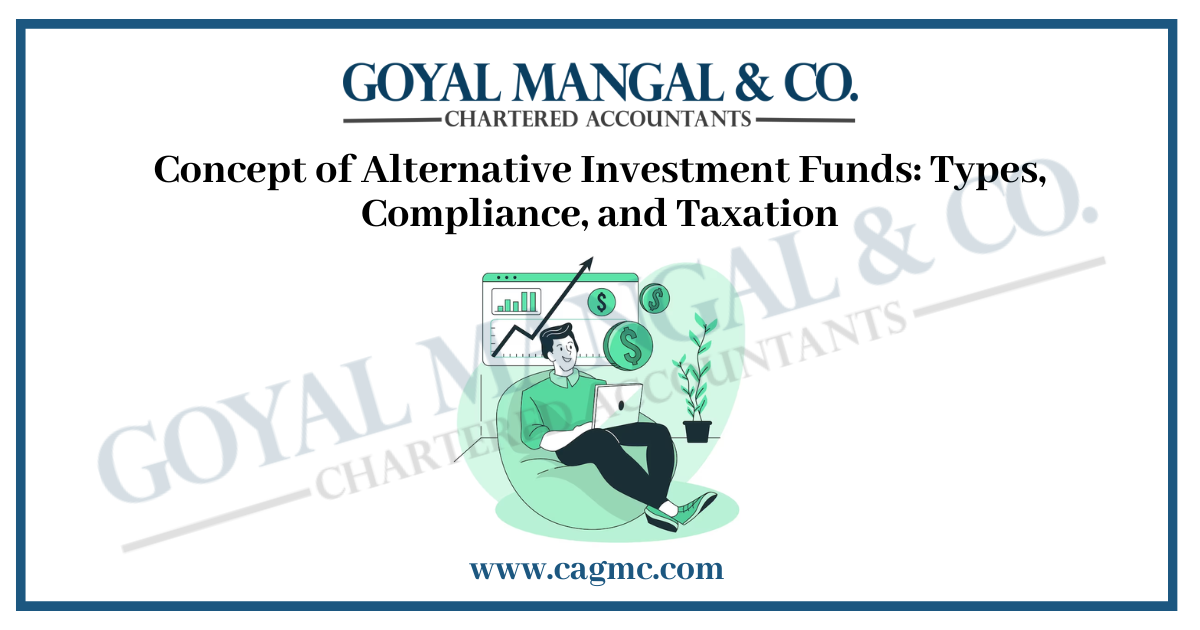
Alternative Investment Funds (AIFs) is a one of avenue gaining fund, which gives a departure from conventional investment vehicles. Along with presenting certain unique opportunities and challenges for those who are extending their investment horizons. The investors are frequently exploring their avenues, which are beyond traditional options to rise in their returns and diversify their portfolios. In the current article, we will discuss a comprehensive understanding of Alternative Investment Funds. Along with the several types, of regulatory compliance and taxation systems.
Table of Content
Overview of Alternative Investment Funds
AIF’s full form is Alternative Investment Funds, which means to investment on vehicles to differ from the traditional investments such as bonds, cash, and stocks. These funds encompass a huge amount of non-conventional assets and investment plans, providing investors with opportunities beyond the mainstream of financial instruments.
AIFs are managed by professional fund managers and are subject to particular regulatory instructions as per the jurisdictions. The term “alternative” in AIF represents the departure from ancient investments and includes a variety of assets like real estate, private equity, hedge funds, commodities, venture capital, etc. AIFs are also known for their potential to give diversification, exposure to new investment opportunities, and essentially higher returns.
Several types of Alternative Investment Funds
There are certain Alternative Investment Funds categories:
- Private equity funds: They invest in private companies generally by acquiring a significant stake. Private equity funds are involved in regulating and reframing the portfolio of companies to develop their value.
- Commodity Funds: Investors may diversify their hedge and portfolios against the fluctuation in product price or inflation. The commodity funds are investing in physical goods like gold, silver, agricultural products or oil.
- Hedge Funds: The aim is to give positive returns instead of market situations and often use leverage and derivates. It is setting up various plans such as event driven to generate returns, short equity or global macro equity.
- Infrastructure Funds: It is a long-term investment with stable cash flows, generally appealing to investors. The funds are to invest in physical assignments such as highways, utilities or airports.
- Cryptocurrency funds: Exposure to highly and emerging volatile cryptocurrency market. It invests in cryptos such as Ethereum and Bitcoin.
- Venture Capital Funds: These funds provide capital to startups in return of equity with high growth of potential.
- Distressed Debt Funds: These funds invest in the debt of financially distressed companies.
- Fund of Funds: It invests in various alternative investment funds instead of directly underlying assets.
- Managed Futures funds: It trades financial futures contracts across several asset classes. The aim is to profit from the world financial markets.
Registration process of AIFs
Here is the registration process for AIFs:
- To recognize the jurisdiction and their regulatory structure;
- Choose the fund’s type and structure;
- Conduct due diligence pre-registration;
- Draft offering documents like private placement memorandum (PPM;
- Appoint service providers;
- Prepare compliance policies;
- Apply to the regulatory authority;
- Review regulatory compliance with applicable laws and regulations and get approval;
- Do compliance with ongoing reporting needs;
- Launch and fundraising for AIFs.
Regulatory Compliances under AIFs
The key regulatory compliances of AIFs are:
- Eligibility and sustainability investor;
- Registration and authorization;
- Risk management;
- Valuation of assets;
- Compliance officer and governance;
- Disclosure and transparency;
- Liquidity management;
- Periodic reporting;
- Custody and safekeeping;
- Anti-money laundering (AML) and know your customer (KYC);
Taxation in AIFs
The taxation system involves AIFs:
- Pass-Through Taxation: Taxation by pass-through entities for hedge funds and private equity funds.
- Income tax on interest and dividends: It is based on the nature of income and tax laws.
- Tax Treatment of losses: There may occur losses in certain investments.
- Capital gains tax: Profits obtained by AIFs, mainly from the sale of assets.
- Withholding taxes: AIFs that invest internationally may be subject to withholding taxes on income obtained in foreign jurisdictions.
- Carried Interest Taxation: In private equity and certain hedge funds, fund managers can receive a share of profits from funds, which is known as carried interest.
- Goods and services tax (GST): AIFs a subject to GST in certain services, and treatment of these indirect taxes can impact the whole tax burden.
- Tax planning and structure: AIF managers generally engage in strategic tax planning and may select a particular fund framework to optimize the fund’s tax potential.
- Reporting and compliance: It is mainly needed to comply with tax report obligations.
End Notes
Here we conclude our exploration of Alternative Investment Funds. It is quite evident that these unconventional vehicles provide a spectrum of possibilities for investors willing to venture beyond the conventional. In a financial landscape characterized by innovation and change, embracing the potential of AIF can be a strategic move. As we know the investment landscape continues to evolve, and a comprehensive guide of AIFs can be a valuable asset for investors for diversification and enhanced alternative investment funds returns.







